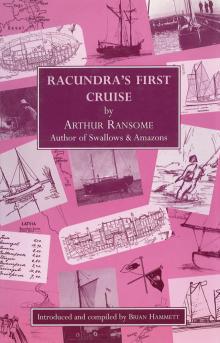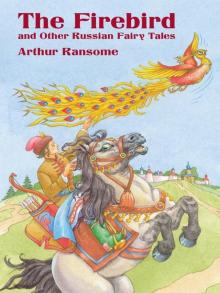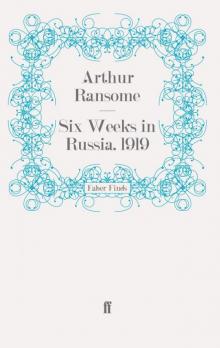- Home
- Arthur Ransome
The Big Six: A Novel
The Big Six: A Novel Read online
CONTENTS
Cover
Title Page
Map
Illustrations
Dedication
I. OUT OF THE DENTIST’S WINDOW
II. FIRST SIGN OF TROUBLE
III. EEL SETT AT NIGHT
IV. MISLEADING APPEARANCES
V. DARKENING CLOUDS
VI. TOW OUT OF TROUBLE
VII. THE WORLD’S WHOPPER
VIII. AT THE ROARING DONKEY
IX. MONEY TO BURN
X. BREAKFAST AT DR. DUDGEON’S
XI. “WE GOT TO EMIGRATE”
XII. WORSE AND WORSE
XIII. TWO WAYS OF LOOKING AT THE SAME THING
XIV. THE FIRST CLUE
XV. RIVAL DETECTIVES
XVI. SPREADING THE NET
XVII. NEWS FROM THE OUTPOSTS
XVIII. A SCRAP OF FLANNEL
XIX. UNWANTED GIFT
XX. DUNLOP TYRES
XXI. MORNING VISITORS
XXII. ANOTHER COAT OF PAINT
XXIII. THE VILLAIN LEAVES HIS MARK
XXIV. THINGS LOOK BLACK
XXV. THE LAST CHANCE
XXVI. A KID FOR THE TIGER
XXVII. SETTING THE TRAP
XVIII. BLINDING FLASH
XXIX. SIEGE OF THE DEATH AND GLORY
XXX. “ALL THE EVIDENCE WE GOT”
XXXI. IN THE DARK ROOM
XXXII. THE LEGAL MIND
WHAT HAPPENED TO THE FISH
About the Author
Also by Arthur Ransome
The Arthur Ransome Society
The Arthur Ransome Trust
Copyright
ILLUSTRATIONS
AT THE STAITHE
THE DEATH AND GLORY INSIDE AND OUT
THE DENTISTS
LIFTING THE POD
ANOTHER ONE TO PUT BACK
MAP
THE BIG FISH
FUNERAL PROCESSION
SAVING SIR GARNET
ESCAPE FROM THE STAITHE
SAILING ON RANWORTH
“IT’S A DIFFERENT TYRE”
DICK’S DRAWING OF THE TYRE–TRACKS
SCOTLAND YARD
DETECTIVES ON THEIR WAY
SOMEONE WAS PATTING THE CHIMNEY
PAINTING THE CHIMNEY
INSIDE THE CABIN
FIVE FINGER PRINT
“IT’S THE CACHALOT”
THE FLASHLIGHT AND ITS SHIELD
THE MOMENT
DEVELOPING
AT THE STAITHE
TO
MARGARET AND CHARLES RENOLD
CHAPTER I
OUT OF THE DENTIST’S WINDOW
PETE had a loose tooth, and could not keep his tongue from jiggling it.
The day had been warm and sunny, one of those pleasant days that so often come towards the end of the summer holidays. The season for hiring boats on the Norfolk Broads was nearly over and there were only two vessels moored beside the staithe. The staithe? Everyone knows the staithe, where boats tie up when calling at Horning. Everyone knows the inn at the bend of the river above it, and the boatbuilders’ sheds below it, and the bit of green grass beside it, and the pump by the old brick wall, and the road with the shops on the further side of it. The staithe is the centre of that riverside world. In midsummer it is a crowded place, what with boats coming and boats going and visitors from up and down the river stepping ashore there as if in a foreign port. But on this September day there were two boats only. One of them was a motor cruiser that had done its season’s work and was waiting to be hauled up into Jonnatt’s shed for the winter. The other was the Death and Glory, which belonged to Joe, Bill and Pete, who were all the sons of boatbuilders and had spent the last few weeks being boatbuilders themselves.
The Death and Glory was unlike any other boat on the river. In the spring she had been no more than an old ship’s boat. Then she had been given a new mast and sail and an awning, so that Joe, Bill and Pete and Joe’s white rat could camp in her at night. But now they had built a cabin-top on her, and decked her forrard, and Joe’s father had made a tabernacle for their mast so that they could lower it for going under bridges. They had made three bunks for themselves inside. They had even got hold of a rusty old stove and cleaned it up and fixed it inside the cabin with a pipe coming out through a hole in the roof. They had had trouble over getting the stove to draw but had got over it in the end by fitting a tall earthenware chimney pot over the pipe. Even then they had found the smoke blowing back into the cabin, so Joe had made a conical tin cap with three legs to it to hold it off the top of the chimney. This worked very well, and if the Death and Glory was the only ship on the river with an earthenware chimney with a mushroom top to it, her owners did not care. They would be able to sit over a fire in their snug cabin even in the winter, and all through this warm day they had been looking forward to lighting up in the cool of the evening. In old days at the masthead there had been a black flag, but this summer they had given up piracy, and they now flew a white flag with a coot on it to show that they were members of the Coot Club started by Tom Dudgeon, the doctor’s son. On the cabin-top was a narrow board fixed up on edge with “SALVAGE COMPANY” painted on each side of it. There was a small flagstaff at her bows with a white three cornered flag with the letters “B.P.S.” to show that the Death and Glory was a patrol boat of the Bird Protection Society, which was really the most important part of the Coot Club. They had spent most of the holidays at work on her, and now she was almost ready for anything. Down in the cabin Joe was busy fixing up a cupboard for stores. On the cabin-top Bill was screwing down a pair of wooden chocks to keep the chimney pot in place. They were expecting Tom Dudgeon to come along with some paint for the chimney. Pete was keeping a look out for Tom, handing screws one by one to Bill, and doing his best to persuade his tongue to keep away from that tooth.
THE DEATH AND GLORY INSIDE AND OUT
Most people who came along the staithe had a pleasant word for the Death and Glories. Mr. Tedder, the policeman, in whose garden they sometimes weeded when Pete wanted worms for fishing, stopped for a moment to look at their chimney.
“Going to put a coat of paint on it,” said Pete.
“What’s the matter with your tooth?” said Mr. Tedder.
“Only a bit loose,” said Pete.
“He ought to out it and have done,” said Bill.
Mrs. Dudgeon, the doctor’s wife, came by, pushing a perambulator, and stopped to tell them that Tom would be a bit late but would be coming along with the paint before dark. It was Tom Dudgeon who had started the Coot Club, with Port and Starboard, Mr. Farland’s twin daughters, who were now away in Paris instead of crewing in their father’s little racing boat. It was Tom Dudgeon who had set them all bird protecting. It was Tom Dudgeon who had had to cast off the moorings of the Margoletta, a big motor cruiser, because her crew of noisy Hullabaloos had moored her over No. 7 nest, the nest of a coot with a white feather, and so had cut her off from her chicks. After that he had been chased all over the Broads, and the Death and Glories had had a share in saving him from his enemies.
“My word,” said Mrs. Dudgeon. “She does look fine now you’ve got the cabin painted.”
“We’ll be going a voyage soon,” said Pete.
“Why, Pete,” said Mrs. Dudgeon. “What have you done to your teeth?”
“Bit loose, one of ’em,” said Pete uncomfortably.
“Don’t swallow it,” said Mrs. Dudgeon, and passed on to say a word to Mrs. Barrable, who had taken a bungalow in the village and was busy at the moment making a painting of Horning Reach, sitting at her easel on the staithe, while her plump pug-dog, William, snored at her feet. She too was a friend of the Death and Glories, and, as Admiral of the Teasel, had had a share in t
he adventures of the spring.
The only passers by who did not have a friendly word for the Death and Glories were a couple of larger boys who strolled along the staithe, stood for a moment in front of Mrs. Barrable’s easel so that she had to stop her painting till they moved on, and raised their voices so that Bill and Pete, busy on the cabin-top, could not help hearing them.
“Interfering young pups,” said one of the two larger boys.
“What business is it of theirs?” said the other.
Pete, sitting on the cabin-top, looked over his shoulder.
“Hear that George Owdon?” he whispered.
“I hear him,” said Bill.
“What’s that other?” said Pete.
“Same sort,” said Bill. “He’s visiting at George’s uncle’s.”
“Lucky it’s not the nesting season,” said Pete and gently jiggled his loose tooth with the tip of his tongue.
“If you jiggle that tooth again I’ll put you overboard,” said Bill fiercely.
“Sorry,” said Pete.
“George Owdon won’t have much of a chance at beardies’ eggs next year, nor yet at buttles’,”1 said Bill. “Now we’ve got her so we can sleep in her, come nesting, we’ll be watching all the time.”
Late in the afternoon, when the sun had swung round and the shadows were lengthening, Mrs. Barrable packed up her painting things and stopped a moment by the Death and Glory to say “Good-bye”.
“Dick and Dot won’t know her when they see her,” she said.
“When are they coming?” asked Bill.
“Four days from now.”
“We’ll be ready before that,” said Pete. “There’s only them cupboard doors to do and the chimbley to paint.”
“If you were to give that tooth a little bit of a jerk,” said Mrs. Barrable, “I don’t believe you’d really feel it coming out.”
“We been telling him all day,” said Bill. He banged on the cabin-top, leaned over and shouted, “Come up, Joe, the Admiral’s just off.”
The noise of hammering stopped and Joe crawled out into the cockpit.
“D’s here in another four days,” said Bill.
“Good luck,” said Joe. “That bring the Coot Club here in Horning up to six. We been short with Port and Starboard away.”
William, the pug-dog, was sniffing noisily along the boat, and put his forepaws on the gunwale as if to come aboard.
“How’s Ratty?” said Mrs. Barrable.
“He’s all right,” said Joe. “PETE!”
“Sorry,” said Peter, closing his lips in a hurry.
“Well, good night,” said Mrs. Barrable. “I hope that tooth falls out before you swallow it, Pete.”
“It’s not all that loose.”
“It doesn’t look to me very solid,” said Mrs. Barrable. “But I expect you know best. Good night. Come along, William.”
They watched her out of sight, with the stout William walking beside her.
“That Tom’s later’n he said,” said Bill. “If he don’t look out, it fare to be too late for paint. Rightly it’s too late already. No use putting good paint to be dewed.”
“What about grub?” said Joe. “It’s that dark below you can’t hit a nail more’n once in three and get your thumb the other two.”
“I’m going to light up that stove,” said Bill. “We’ll do no painting now.”
They tidied up on deck and went into the cabin. Bill lit a fire in the stove, Joe put a kettle on, and, after admiring the way the chimney drew and the fire roared up with a single match, they went out again to admire the smoke blowing away from the top of the chimney.
It was slow work boiling a kettle on the stove, but it saved paraffin, and when the stove was burning it was better sense to use it instead of lighting a primus in the ordinary way. They sat on the cabin roof watching the sun go down and taking turns to go below to see what was happening to the kettle. When at last the singing of the kettle turned to a brisk bubbling and then quietened while a steady jet of steam poured from the spout they went down into the cabin, made tea, lit their hurricane lantern, hung it from a hook in the roof, and settled down to a solid supper of bread, cheese, butter, marmalade (a present from Mrs. Barrable) and apples. Joe let his white rat out of its box and it sat on his knee on its hind legs, eating bread soaked in milk and nibbling at a nut which it held in its forepaws like a squirrel.
“She’s snugger’n a wherry,” said Joe, sitting on his bunk by the stove and looking into the forepart of the old boat at the cupboard on which he had been working.
“Fit to cruise anywheres,” said Bill. “Pete! Do leave that tooth alone.”
“That fare to drive anybody mad,” said Joe, “seeing you sitting there goggling at us and jiggling that tooth like it were on a hinge. Bill, we’re short of screws for that cupboard door. Can’t make do with nails for that.”
Pete sucked his tooth into place. “I got some,” he said. “Three. And I’ll get some more tomorrow. My Mum promise me threepence when I out that tooth.”
The others turned on him. “If you’d have said that before,” said Joe, “we’d have had it out in two twos. Too late now with the shops shut. But if it ain’t out before morning we’ll take pincers to it.”
“It’s getting looser all the time,” said Pete.
“Well, you out it,” said Bill.
The sun had gone down and it was nearly dark outside before running steps sounded on the staithe and there was a tap on the roof of the cabin.
“Who go?” said Joe.
“Coots for ever,” said Tom Dudgeon coming aboard.
“And ever,” answered Joe, Bill and, after a moment’s pause, Pete.
“Mind your head,” said Joe, as Tom stooped in the cockpit to come in through the cabin door. He was too late. Tom was several inches taller than the tallest of the Death and Glories.
“I’ll never get in without bumping if I live to be a hundred,” said Tom, dropping down on Bill’s bunk and feeling carefully to make sure there was room to spare between his head and the beams. “Sorry I’m so awfully late. Too late for painting, but I’ve brought the paint. I’ve shoved it under the after deck. Hullo! What’s the matter with Pete?”
“Loose tooth,” said Pete.
“He’s been jiggling, jiggling it all day till we want to knock it down his throat,” said Bill.
“And threepence coming to him when he out it, the young turmot,” said Joe.
“I’m going to out it,” said Pete warily.
“Well, you out it now,” said Joe. “We won’t look.”
Pete turned his back to the others and there was a long silence.
“Outed?” said Joe at last.
“It won’t come,” said Pete.
“Let’s have a look at it,” said Tom. “Why, it’s as loose as anything. Just give it a pull.”
“Don’t touch it,” said Pete.
“Pull it out or stop jiggling,” said Joe.
Pete did not answer.
For some time the others sat there talking in the flickering light of the lantern watching the red glow of the stove. They were talking of what they would do when Dick and Dorothea came. Of course it was a pity that Mrs. Barrable was living in a bungalow now instead of in a boat. But, after all, Tom had his Titmouse for sailing, and the Death and Glory was ready to voyage once more. They would be able to do a good deal.
“He’s at it again,” said Joe suddenly.
All three of them looked at the unlucky Pete who hurriedly withdrew his tongue and let the tooth drop back into its place.
Tom laughed. “Upper tooth,” he said. “And just hanging. I say, if you don’t pull it out you’ll go and swallow it in the night…. And what about your threepence then? My mother never gave me a farthing for the two I swallowed. Get it out and have done with it. I read in a book once … I say, Pete, I know a way of getting it out so that you’ll never feel it go.”
“I’ll out it myself,” said Pete.
“Oh come
on, Pete,” said Bill.
“Don’t waste it,” said Joe.
“It won’t hurt him at all,” said Tom. He spoke privately to Joe.
“We got some fishing line,” said Joe.
“That’ll do,” said Tom.
“No that won’t,” said Pete. He turned his back on them and fingered his tooth again.
“Come on,” said Tom. “You get that line and we’ll want … I say, Bill….”
“Easy,” said Bill. “I’ll slip across and get one. Come on, old Pete.”
They went out into the cockpit and Tom bumped his head again in getting through the door. It was very dark outside, but the short stumpy mast of the Death and Glory showed against the sky.
“It’s not high enough,” said Tom.
“She wouldn’t carry more sail,” said Joe.
“Even if he climbed to the top it wouldn’t be high enough,” said Tom.
“I don’t want to do no climbing,” said Pete.
“What we really want’s a house,” said Tom. “Come on. Have you got torches?”
“Gone pretty dim,” said Joe.
“Mine’s all right,” said Tom. “I’ll go first. The loft over Jonnatt’s boatshed’ll do. Where’s Bill?”
Bill came hurrying out of the darkness. “I got it,” he whispered to Tom.
“I’m going home,” said Pete.
“And you a Coot,” said Joe. “Tom won’t hurt you.”
They went along the staithe and in at the open doors of the big boatshed, moving carefully because of the rails that ran down from the shed into the river. Tom went first lighting the way with his torch. They climbed up the ladder into the sail loft. Pete was still jiggling his tooth in the hope that it would come out of itself. The others knew he was jiggling it because every time they spoke to him there was a pause before he answered.
Tom, avoiding piles of boat gear, stored spars and spread-out sails, went to the window which looked out over the slipway and river. Joe gave him a coil of fine fishing line. Bill gave him a brick which he had taken from the loose top of the wall between the staithe and the road. Pete sat by himself on a bundle of sail close by the top of the ladder, jiggling his tooth in the dark.

 Peter Duck: A Treasure Hunt in the Caribbees
Peter Duck: A Treasure Hunt in the Caribbees Racundra's First Cruise
Racundra's First Cruise Great Northern?
Great Northern? Swallowdale
Swallowdale Swallows and Amazons
Swallows and Amazons Winter Holiday
Winter Holiday Missee Lee: The Swallows and Amazons in the China Seas
Missee Lee: The Swallows and Amazons in the China Seas Pigeon Post
Pigeon Post We Didn't Mean to Go to Sea
We Didn't Mean to Go to Sea The Firebird and Other Russian Fairy Tales
The Firebird and Other Russian Fairy Tales Coot Club
Coot Club The Big Six: A Novel
The Big Six: A Novel Six Weeks in Russia, 1919
Six Weeks in Russia, 1919 Secret Water
Secret Water The Big Six
The Big Six Missee Lee
Missee Lee Peter Duck
Peter Duck The Picts and the Martyrs
The Picts and the Martyrs